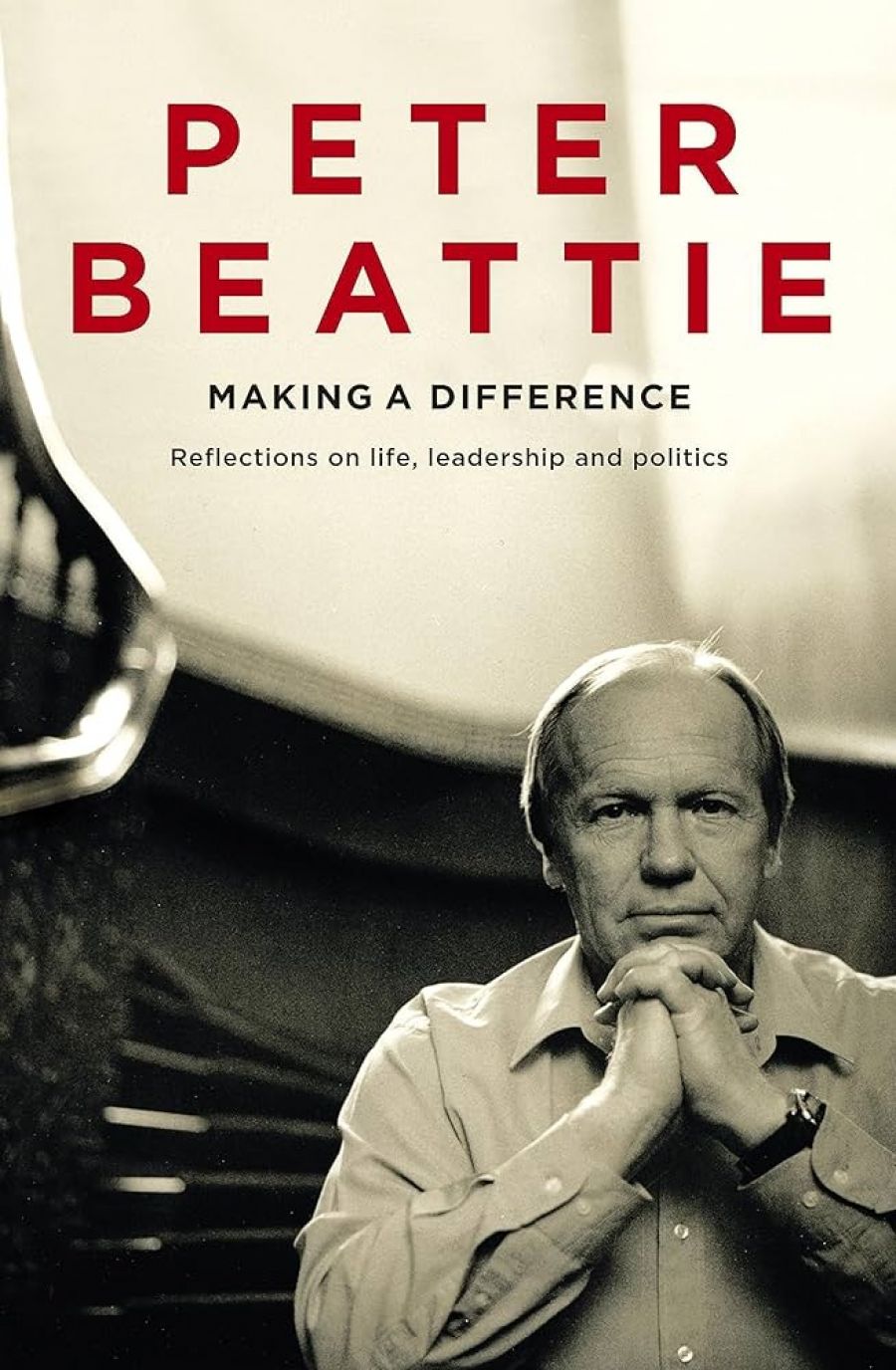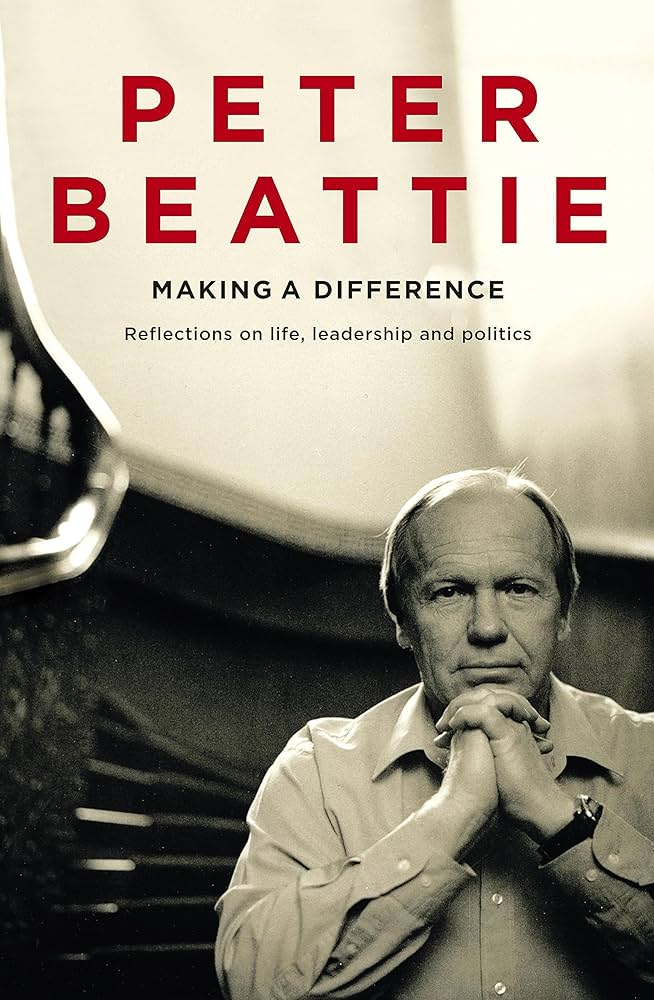
- Free Article: No
- Contents Category: Memoir
- Review Article: Yes
- Article Title: Out there doing something
- Online Only: No
- Custom Highlight Text:
If we adopt a charitable view about political memoirs, it is generally preferable that serving or newly departed politicians should pen their reminiscences. If they are any good, it is a bonus. To have their particular ‘take’ on events and personalities is a valuable addition to the historical record, even if such products err on the side of self-indulgence and egocentricity. Most politicians, unfortunately, take their secrets with them when they go. Moreover, to write, or collaborate in, one’s memoirs while still in public office is a remarkable achievement – undertaken only by Peter Beattie and Bob Carr in recent times.
- Book 1 Title: Making a Difference
- Book 1 Subtitle: Reflections on life, leadership and politics
- Book 1 Biblio: HarperCollins, $29.95 pb, 310 pp
- Book 1 Cover Small (400 x 600):

- Book 1 Cover (800 x 1200):

With this in mind, Beattie’s second volume of memoirs is interesting in how it lays bare his personality and recounts his formative influences – often with some candour. He is now the elder statesman of the current Labor state premiers, having notched up over seven years in the job (and perhaps aiming for ten and a half, to become Labor’s longest-serving Queensland premier). Yet he has felt the need to pause along the way and commit his thoughts to paper. Why?
The reasons may be complex, but there are some clues in Making a Difference. In part, the book is a profession of faith to his electorate, sliced into digestible portions. We are told who has influenced him, what political values he stands for, and his vision for a better Australia. He gives us his assessment of leadership, preferring visionary and transformational leadership to ‘management’. Most of all, he is worried at some of the criticisms levelled against some of his counterparts, such as Neville Wran or Bob Carr: that they served in office for long periods but made very little difference as leader. He most decidedly does not want to go down in history as a time-serving premier. This book is about him getting his version out there.
It is also a sanguine rehash of his time in state Labor politics. The hue is positively rosy. His account ignores or glosses over most of the monumental conflicts and presents many of the key protagonists as cardboard characters devoid of motivations, with the factions almost obliterated from sight. Conversely, he waxes lyrical about his own conciliatory initiatives, his refusal to ‘take shortcuts and line up with the old political machine’, and about his personal role in bringing ‘change and reform’ to the ALP. As you might expect, the first-person pronoun is the most frequently used word in the book. But this is not without its revelations.
He unblushingly thinks of himself as the party leader from day one in parliament (early 1990) when he was a solitary backbencher under Wayne Goss. From his perspective, ‘the Labor Party had, in effect, two leaders – one the premier, and the other to whom some sections of the Party tended to look for leadership’. He pretends that he and Goss got on and never ‘had as bad a relationship as some might have imagined’, although he entirely skips Goss’s second term (when Beattie was consigned to the wilderness as a ‘loose cannon’). He believes that he personally turned Labor’s fortunes around when in opposition (1996–98) with an avalanche of policy statements, but does not mention arguably the one circuit-breaker policy that distinguished his campaign – an astute promise committing his government to bring unemployment down to a reduced target of five per cent by 2003. And although he notes that Labor’s campaign was ‘derailed a little’ by One Nation, he also neglects to mention that Labor’s vote actually dropped in 1998 (to 38.9 per cent), down from its low point in 1995 of 42.9 per cent.
Beattie charts the ups and downs of Labor in government after 1998, but only from a personal perspective – in particular, whether issues and events impacted on him. Not a full record of events, at one stage it jumps from the landslide election result of 2001 to 2004 with no intervening text. We learn that question time in parliament gives him ‘the most fun I’m allowed to have as premier’. We do not get a sense of what it is like to be premier. He just wants ‘to be out there doing something’.
The book is also largely cathartic, exorcising ghosts of past mistakes and decisions regretted. Principally, this involves his grandmother, who raised him in North Queensland and who held diametrically opposed political views. After an argument, he was pig-headed enough not to attend her funeral – a decision he regrets deeply. If ‘Nana’ is not constantly looking over his shoulder today, this book was meant as a belated tribute to her and to her stewardship.
As memoirs go, this is a significant book by a major political actor. It is mostly serious in subject matter and persuasive in tone. It is not a book for historians, political strategists, or students of government. Some key figures in Queensland politics rate barely a mention: Wayne Swan or Kevin Rudd figure only as attending the occasional political wake; others, such as Mike Kaiser (Beattie’s first campaign manager and brief backbencher), are erased. Beattie does not pretend to be an historian or to engage with previous explanations. What we have is a very personal picture told from first-hand experience when things affected him. Unlike Paul Hasluck, he is not an acute observer of other people or able to probe their motivations. His only references are to his first book of memoirs, his own press releases and a few musings from his local journalists or political mates. But it provides us with probably the most serious and comprehensive account of a modern progressive leader that we have in print. When Beattie finally leaves the stage as premier, Making a Difference might be read as a long valedictory essay. But I think the final valediction is some way off. For a man who steels himself by crises and tests of character, Beattie plainly has much more to do and the stamina to do it.


Comments powered by CComment